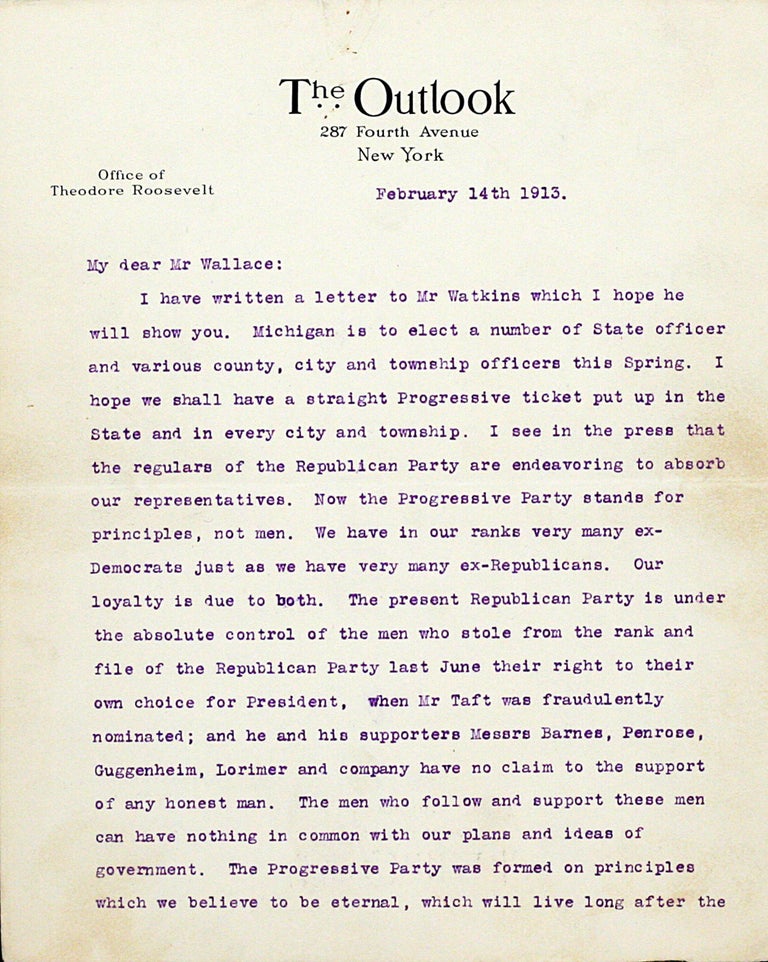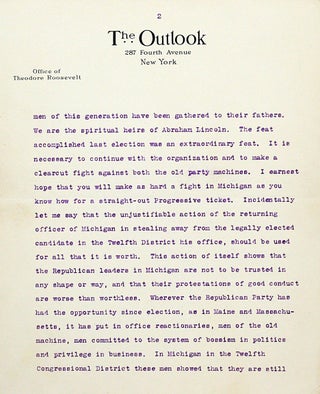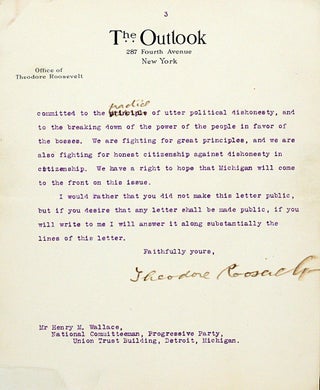Typed Letter Signed
“The Progressive Party was formed on principles which we believe to be eternal, which will live long after the men of this generation have been gathered to their fathers. We are the spiritual heirs of Abraham Lincoln. The feat accomplished last election was an extraordinary feat. It is necessary to continue with the organization and to make a clearcut fight against both the old party machines...
“We are fighting for great principles, and we are also fighting for honest citizenship against dishonesty in citizenship...”
PASSIONATE AND IMPORTANT LETTER BY THEODORE ROOSEVELT DEFINING THE NATURE OF THE PROGRESSIVE PARTY.
The letter, signed and typed by Roosevelt on letterhead of The Outlook magazine (where Roosevelt was a contributor and associate editor) and dated February 14, 1913, is addressed to Progressive Party Committeeman Henry Wallace and reads in full:
The Outlook
287 Fourth Avenue
New York
February 14, 1913
My dear Mr. Wallace,
I have written a letter to Mr Watkins which I hope he will show you. Michigan is to elect a number of State officer and various county, city and township officers this Spring. I hope we shall have a straight Progressive ticket put up in the State and in every city and township. I see in the press that the regulars of the Republican Party are endeavoring to absorb our representatives. Now the Progressive Party stands for principals, not men. We have in our ranks very many ex-Democrats just as we have very many ex-Republicans. Our loyalty is due to both.
The present Republican Party is under the absolute control of the men who stole from the rank and file of the Republican Party last June their right to their own choice for President, when Mr Taft was fraudulently nominated; and he and his supporters Messrs Barnes, Penrose, Guggenheim, Lorimer and company have no claim to the support of any honest man. The men who follow and support these men can have nothing in common with our plans and ideas of government.
The Progressive Party was formed on principles which we believe to be eternal, which will live long after the men of this generation have been gathered to their fathers. We are the spiritual heirs of Abraham Lincoln. The feat accomplished last election was an extraordinary feat. It is necessary to continue with the organization and to make a clearcut fight against both the old party machines. I earnest hope that you will make as hard a fight in Michigan as you know how for a straight-out Progressive ticket. Incidentally let me say that the unjustifiable action of the returning officer of Michigan in stealing away from the legally elected candidate in the Twelfth District his office, should be used for all that it is worth. This action of itself shows that the Republican leaders in Michigan are not to be trusted in any shape or way, and that their protestations of good conduct are worse than worthless.
Wherever the Republican Party has had the opportunity since election, as in Maine and Massachusetts, it has put in office reactionaries, men of the old machine, men committed to the system of bossism in politics and privilege in business. In Michigan in the Twelfth Congressional District these men showed that they are still committed to the principal [corrected by hand to “practice”] of utter political dishonesty, and to the breaking down of the power of the people in favor of the bosses. We are fighting for great principles, and we are also fighting for honest citizenship against dishonesty in citizenship. We have a right to hope that Michigan will come to the front on this issue.
I would rather that you did not make this letter public, but if you desire that any letter shall be made public, if you will write to me I will answer it along substantially the lines of this letter.
Faithfully yours,
[signed] Theodore Roosevelt
Background:
The date is February 14, 1913. The past year - the election year of 1912 - had been quite eventful for Theodore Roosevelt and for the nation. Tensions were high within the Republican Party after President William Howard Taft, presidential successor to Roosevelt and fellow Republican, failed to carry out the anti-trust crusade that Roosevelt had begun in his own presidential term. Infighting and hostility during the 1912 Republican National Convention in Michigan led to a major schism in the Republican party; namely, the creation of the “Progressive” or “Bull Moose” Party led by Theodore Roosevelt, the Party’s presidential candidate. Although Roosevelt lost to the Democrat Woodrow Wilson, he received more votes than the Republican Taft, becoming the only third-party candidate in U.S. history to finish higher than third in a presidential election; it was because of the splitting the Republican votes between Taft and Roosevelt that Democrat Woodrow Wilson was able to seize the victory.
During this tumultuous political moment, Roosevelt reveals in this letter to Progressive Party Committeeman Henry Wallace what he views to be the essence of the Party and outlines a plan for the future.
Defining the Progressive Party:
Roosevelt emphasizes that the Progressive Party stands for “principles, not men”, noting specifically that “The Progressive Party was formed on principles which we believe to be eternal, which will live long after the men of this generation have been gathered to their fathers. We are the spiritual heirs of Abraham Lincoln.” This a critical point for Roosevelt as he tries to elevate the Party beyond the personalities of the moment. It also allows him to underscore the corrupt nature of the Republican Party which (as opposed to the Progressives, according to Roosevelt) has become a reflection of the self-interest of a handful of powerful men.
Roosevelt then names some of these men to further illustrate their influence and to reinforce one of his major themes: that it is essential for the Progressives to work hard to restore power to the citizens.
On the failures of the Michigan convention and his plan for the future of the Party:
“Michigan is to elect a number of State officer and various county, city and township officers this Spring. I hope we shall have a straight Progressive ticket put up in the State and in every city and township. I see in the press that the regulars of the Republican Party are endeavoring to absorb our representatives.”
One of the central tenants of the Progressive platform was a restructuring of American politics through the growth and development of localized parties to best foster direct links between government officials and public opinion. It was because of this focus on local governments that Progressives set their sights on securing seats within state, county, city, and other municipal legislatures. After Roosevelt’s loss in the 1912 national election, Progressive success in smaller races became all the more important to the future of the Party.
On the legacy of the Progressive Party:
“We are fighting for great principles, and we are also fighting for honest citizenship against dishonesty in citizenship.”
Many have suggested that the rise of the Progressive party seemed a logical next step after the Gilded Age, a period of American history in which laborers suffered at the hands of an elite and wealthy few. The Progressive Party Platform of 1912, of which Roosevelt was one of its many co-authors, asserted that “In accordance with the needs of each generation the people must use their sovereign powers to establish and maintain equal opportunity and industrial justice, to secure which this Government was founded and without which no republic can endure.”
While Roosevelt himself was unable to reach federal office under the Progressive Party name, the reforms promoted by himself and his colleagues had lasting impacts on American society, culture, and economy. Franklin Roosevelt’s “New Deal” drew heavily on the Progressive Party’s platform and many of the goals of the Progressive party--anti-trust regulation, labor reform, health care reforms, and crackdowns on political corruption--were all ideas that developed well beyond Roosevelt’s era influencing even the politics of today.
New York: February 14, 1913. Written on three sheets of Roosevelt’s letterhead (“Office of Theodore Roosevelt”) from the weekly magazine The Outlook, which Roosevelt edited beginning in 1911. Housed in a custom presentation folder. Bearing one holographic correction (changing “principle” to “practice”). Almost invisible repairs to extreme margins of third leaf (not near text). With a large, strong Roosevelt signature.
A HISTORICALLY IMPORTANT LETTER CONCERNING ONE OF THE UNITED STATES‘ MOST INFLUENTIAL POLITICAL MOVEMENTS.
.
Price: $11,000 .




